This is How You Are Saving Lives in Bangladesh
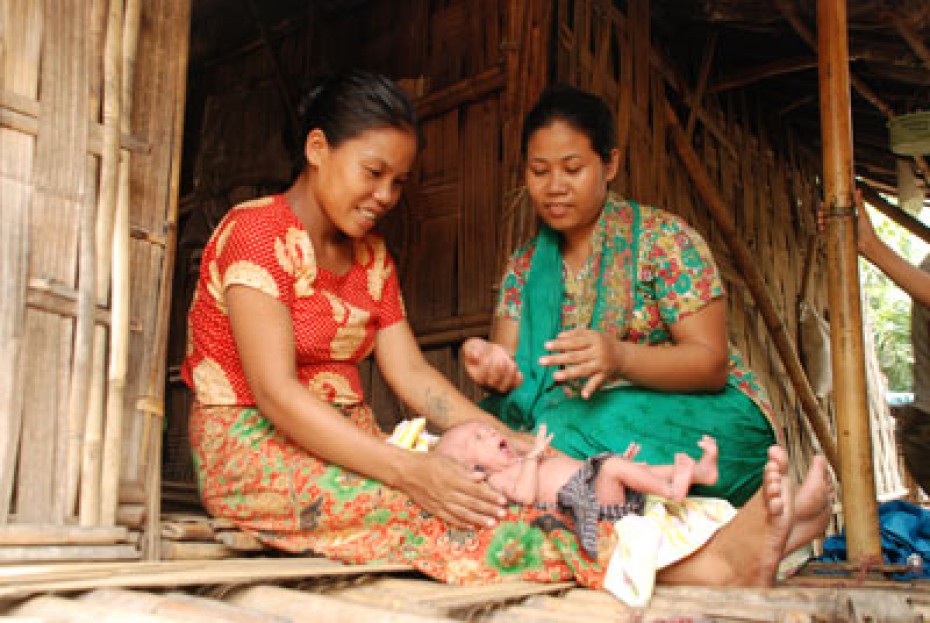
Mothers in the Child Survival Program (CSP) are under the care of an expert CSP implementer during deliveries. This decreases the chance of infant mortality. The awareness program, baby training and other assistance (like nutrition and baby kits) provided through the program helps ensure a healthy mothers and babies.
Continue Reading ›The Children’s Mite
Children are the most ignored and vulnerable group in Bangladesh, and the children we serve there are some of the poorest in the world.
But these children, who live in circumstances we can’t imagine, are learning to see hope in their lives and how to help others.
When they heard about the Jan. 12 earthquake in Haiti and that Compassion-assisted children were affected, it broke their hearts. Every day they were at the development center, they prayed. But they went beyond that as well.
Continue Reading ›A Clean Drinking Water Lesson
The availability of clean water can be taken for granted in developed countries such as the U.S. or U.K. For people in Bangladesh, however, clean water can be scarce.
In many remote places in Bangladesh, people may never drink clean water. They suffer from waterborne diseases, which are adopted into their lives as normal.
Flying over Bangladesh, you see hundreds of rivers and canals covering the country. But most of these water sources are badly polluted and not safe for drinking or other uses.
So not only is it difficult to provide food for everybody in this impoverished country, it is even more difficult to ensure safe drinking water for the people of Bangladesh.
Haydarnashi Child Sponsorship Program has had a problem finding clean water from the very beginning. The cook had to carry drinking water for 142 children every day. He also had to carry the water for daily cooking. (more…)
Holding Hope
![]() I will never forget something a dear friend said to me years ago. I was struggling in my Christian walk. I had hit what I presumed to be rock bottom. I told him that I had lost all hope for happiness.
I will never forget something a dear friend said to me years ago. I was struggling in my Christian walk. I had hit what I presumed to be rock bottom. I told him that I had lost all hope for happiness.
“Then I will hope for you,” he said, matter-of-factly.
What? Is it possible to carry someone else’s hope? What a beautiful, selfless sentiment.
I eventually pulled through my situation. Peace came. And I wonder how much of it was because of my friend’s odd but wonderful offer.
Over the years, this concept of holding on to hope for someone else has stuck with me. To be honest, it still sounds impossible. But I hope not. Because I recently heard a heartbreaking story from Bangladesh. A story about lost hope. (more…)
Heartbreak in Bangladesh: Cyclone Aila
They are the most heartbreaking reports I’ve seen during my 12 months in this job. (Not that you can really quantify or categorize something like this, but last week was the first time I cried reading a crisis report.)
Cyclone Aila. If you haven’t heard about it, don’t feel bad. It really hasn’t been in the news much at all.
None of the major world news sites say anything about it. When I checked yesterday, they all had headlines about singing sensation Susan Boyle, but nothing about Cyclone Aila. However, just because there are no headlines doesn’t mean there is no news.
Over the past week, David Adhikary, our communications specialist in Bangladesh, has been sending photos and reports from the midst of the cyclone’s aftermath. They are devastating. Here are a few excerpts from his reports …
“During the disaster night, the children and their families suffered a lot. The cyclone took down their houses, and after that the dams were destroyed. Some of children had to stand in water for the whole night. The center staff found many of the children in a wet condition.”
“The Compassion center staff and the parents of the children are very anxious about the aftereffects of the flood. The dead animals could cause dangerous diseases, and the probability of malaria is very high.”
“There is not a single house in the village that hasn’t been affected by floodwater. The village is near the sea and the river water is very salty. The floodwater mixed with their water sources and made it impossible to drink.
“The water crisis is the major problem for the people. People were seen drinking the polluted floodwater to put off their thirst. The floodwater is very dirty and stinky. The dead animals and fish are floating all over the water. Children of that area are also drinking the same water.”
Worse …
“The affected families have taken shelter at the nearest market. The families are staying with the animals in the market. The marketplace is badly polluted as the people are using the place for all kinds of uses.
“There is no toilet and the people are using free spaces for a toilet.
“The adult girls are staying with their families in the marketplace. Their parents are very anxious about their daughters because at nighttime they have to stay with lots of unknown people together in the marketplace.”
And perhaps saddest of all …
“This morning we received very sad news about one of the children we assist. Her mother committed suicide just after the cyclone disaster. Their house was broken down and she committed suicide out of her frustrations. She lost her husband last year during Cyclone Sidr. She faced many challenges last year and finally gave up. [The children] are now orphans and vulnerable. They lost their father and mother in two consecutive cyclones. Please join us in pray for these children.”
Oh, God.
It feels like it’s too much, doesn’t it? When I read stuff like this, I find myself begging Jesus to hurry up and return and make all things right. It’s difficult not to get overwhelmed with despair.
The crazy thing is, though, God has placed Compassion right in the midst of this mess. Because of our unique church-based structure, our child development centers are distributing food and water where even relief agencies haven’t been able to access!
Families who lost their homes and have nowhere to cook are receiving hot meals at the child development centers. During the next few weeks, the centers will provide them with dry food, oral rehydration therapy and water purification tablets.
If you sponsor a child in Bangladesh and your child has been affected by Cyclone Aila, we will contact you as soon as we receive information about your child.
A New Day for Kamrul
Kamrul starts his day very early in the morning. He leaves his bed just after sunrise and washes his face from the nearest pond. After having a little cold rice from the previous night, he leaves for work.
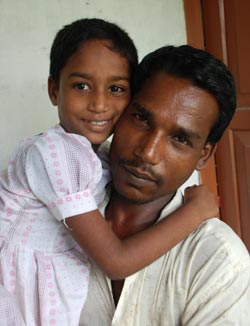 These days, Kamrul feels very relaxed. He doesn’t have to pay rent to the cycle van owner daily. He has his own van now. It is the most useful gift for his family.
These days, Kamrul feels very relaxed. He doesn’t have to pay rent to the cycle van owner daily. He has his own van now. It is the most useful gift for his family.
Kamrul has been blessed by your generosity. His new cycle van ensures a decent life for his family. Kamrul considers himself a fortunate father of a Compassion-assisted child. His 8-year-old daughter, Mukta, is the channel of blessings in his family.
Every morning, Kamrul drives to the nearest village market for passengers or a load to carry. If he is fortunate enough, he can get more than two passengers at a time and heavy stuff to carry. He earns 100-120 taka (U.S.$1.45-$1.74) per day by driving his cycle van.
“One hundred taka ($1.45) per day for me is the same as 100,000 taka ($1,450) for the rich people living in the big cities. This 100 taka allows me to buy food for my children and keep my family.”
In the rainy and cold season he earns less than that, but the money is still adequate to buy food for his children. It wouldn’t be possible if he didn’t have his own cycle van.
Previously, he had to pay around 100-120 taka as rent for a cycle van. He had very little left for his family. To pay the owner on a regular basis was a Herculean task for Kamrul. It took eight out of his 11 hours of working to earn the money for the owner.
Now Kamrul believes that his bad days are over and he can do something more for his children and family.
Kamrul’s working hours are now more flexible. To work eight hours throughout the day is enough for him to take care of his family.
Whenever he is on the road driving his cycle van, he keeps the faces of his children in his mind rather than the worry of paying the owner of the cycle van. You made this possible for him. (more…)
Visit Compassion’s Fun Kids Web Site
Are your children pretty web savvy? Do they spend a LOT of time online? I mean are they typical kids? 🙂
How about you? Are you a kid at heart?
If you said yes to any of these questions, we have some exciting news just for you.
We just launched our new kid’s Web site, Quest for Compassion, and we think that it is not only engaging but entertaining too! We love it, and are confident that your kids will as well. Not only is the site fun, but it’ll educate your youngsters all about the ministry of Compassion.

The site is designed for children between the ages of 6 and 10, and it provides a virtual opportunity for them to travel around the world — to four different countries where we work: Ghana, Bangladesh, El Salvador and Brazil.
It helps your kiddos experience a Compassion child development center and the surrounding community, and will give them perspective on what a child’s life in the developing world is like.
Each child will “build his or her own buddy” to travel with — by choosing gender and skin color — and will be able to give the buddy a name. Then they can pick a region of the world to travel to.
Each town and country is filled with objects to click on and games to play. And with the help of their “buddies,” your world travelers can also learn key words and phrases in each country’s native language. Through these various games and fun facts, your children will get to see and hear about the life and culture of our Compassion kids around the globe.
We created the Web site through the use of real-life still shots taken in the countries where we work, which we brought to life through the use of animated children, teachers and animals that your children will meet along the way.

This is a new, fun and safe way for children, and even for you, to learn more about our ministry.
Visit the site today with your children to discover who and what awaits you! And be sure to tell us what you think.
Presents for the King
The church was packed with 200 children and their parents, celebrating the pre-Christmas program with the Compassion child cevelopment center. When the host announced the opening of the program, the room burst with clapping.
Laboni was there with her sister Sraboni. Everything around Laboni was entirely new for her. She belongs to a Christian family, but in their lives Christmas is just like every other regular day. There has been nothing very special about Christmas except going to church in the morning.
But after Laboni and her sister got registered at the child development center, everything around her has been changing in a positive way. The meaning of Christmas has also changed.
Kamrul Receives His Cycle Van
Kamrul received the cycle van you bought him! He received it eight days ago.
It was another hot afternoon at Suagram, and Mukta ran to her grandmother’s house. “Granny! Granny! Come out.”
An elderly woman came out; Mukta said loudly, “I am going to have a cycle van tomorrow. Now my father will drive my own cycle van.”
Her grandmother asked, “Who is giving you a cycle van?”
The 8-year-old girl replied proudly, “My Compassion center!”
The next day was very special for Mukta, her father, Kamrul, and their family. They were going to have a brand new van, as a gift from Compassion sponsors who read the U.S. blog.
Kamrul and his family dreamed about having their own cycle van for years. Although they considered Compassion as the great opportunity for their daughter’s development, they never thought that their dream of a cycle van could come true through the Compassion center. However God had a different plan for this family, and He used Compassion to bring blessings to them.
I reached Suagram Child Development Center at 8 a.m. Kamrul was there, waiting for me. He grabbed my hand and said, “Thank you so much, for what you did for us.”
I replied, “Don’t thank me. Thank Almighty God for his grace and thank the sponsors who made it possible.”
Kamrul said again, “I praised God thousands of times. Me and my family prayed for the sponsors and their families, that they could live a long, healthy and happy life.”
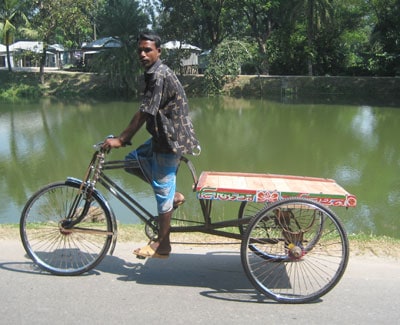
We went to the marketplace called “Ghaghar” to buy the cycle van. The child development center manager was also with us; he ordered the van the previous week. It was a nicely built cycle van.
The center manager was checking the cycle van, but I was observing the reaction on Kamrul’s face. There was a deep satisfaction and peace.
The center manager paid the bill and asked Kamrul, “Are you happy?”
He answered, “I couldn’t wish for more. This van will change the condition of my family.”
Kamrul took us on his new cycle van as his first passengers. He was driving faster than the previous time I rode his van. I thought there might be two reasons. The new cycle van was excellently made, and at that time Kamrul was the happiest man on the earth and wanted to fly.
We reached his house and paid him. Kamrul strongly refused to take money from me, but I was able to make him understand that he should take it as his first income from the van.
At his house, Mukta was waiting for us. As soon as Kamrul parked the van, little Mukta hopped on the van. She stood on the van and silently made us believe that it was her van.
Kamrul and his wife Rehana were getting busy to entertain us. The center manager tried to stop them, but Kamrul answered, “We couldn’t be able to give a treat to our beloved sponsors. So please let us entertain you with coconut water on behalf of the sponsors.”
Coconut water is a special drink in the rural areas; only special guests are entertained with coconut water. Kamrul and Rehana prepared and served coconut water to us. It was one of the sweetest and most refreshing drinks I have ever had.
Kamrul, Rehana, Mukta and little Sihab (Mukta’s younger brother) were sitting in front of us, and we were talking outside their house. A few neighbors also joined us.
I described to Kamrul and family about how our respected sponsors provided them the van. Kamrul shared his feelings:
“I am so pleased and amazed by the greatness of the Compassion sponsors. I struggled a lot with my family. Not even my own brother and sisters took care of us, but these people from thousands of miles away are thinking of our benefits.
This is amazing!
Now I can earn my own living and don’t have to pay the van owner daily. If I can work everyday then I won’t have any problem to maintain my family. At least I can buy food everyday for my children.
Please thank the sponsors on behalf of me and my family. Also tell them that their love is blessings for my family.
May God bless them and their children everyday!”
Rehana said, “Now my husband can work more freely. Hopefully we would overcome our difficult periods. Thanks to all the Compassion people and staff who made it possible for us. They think about us more than our own relatives.”
Mukta was having fun on the van. She said, “This is my van, and I will let my father drive it.”
Kamrul was laughing and replied, “Yes dear, it is your van.”
Mukta thanked all the sponsors in her own words and said in Bengali, “Amake van kine debar jonno tomader sobaike onek onek dhonnobad.” It means, “Many thanks to all of you for buying me this cycle van.”
Kamrul took his whole family on the van and had a fun drive. Later he picked up Mukta from the project on his van and took her home.
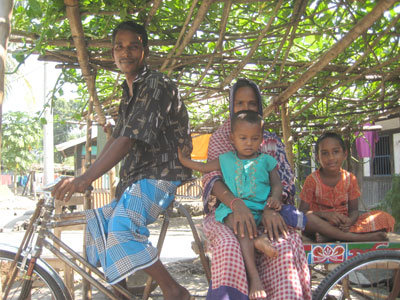
The gift amount was 10,200 Bangladeshi taka. The cycle van cost 9000 taka, and with the remaining 1,200 taka, the Compassion center bought a new pair of shoes for Mukta, a mosquito net, and two pillows for Kamrul’s family — things Kamrul and Mukta asked for.
It was a big day for this family. The satisfaction on Kamrul and Mukta’s face reminded me of the Grace of our heavenly Father.
Special thanks to all the sponsors who considered Kamrul as their own brother and Mukta as their own niece.
Today’s post is a followup to the August 7, 2008 post, A Day in the Life of a Bangladeshi Cycle Van Driver.
7 Questions With David Adhikary
Thanks for asking your questions of David, the Compassion field communication specialist in Bangladesh. Here is the wisdom he has to share with us!
1. First of all, thank you so much for all you do for the precious children of Bangladesh! My question is, as you go through each day seeing a multitude of needs in these children’s lives, what do you find yourself praying for most often? (Lindy)
You are always welcome. Actually, I feel a deep pain when I find myself in a position where I can’t afford to help each of my children to solve their problems.
Every night I pray that at least they could have their dinner and have a sound and peaceful family environment.
2. I would like to know the specifics of how the global food crisis is affecting the people in Bangladesh and how it has affected Compassion’s program there. Have you cut back days that the children meet? Has it made a difference in the type of food that you can afford to serve the children? (Cheryl J)
The price of rice and other food products including lentils, flour, oil, and sugar are increasing continuously from last year.
According to different sources, the cost of the cheapest rice has increased by over 90 percent, and for the better grade rice, it is over 64 percent.
According to the statistics provided by the World Bank and United Nations, the daily income of a lower-level person in Bangladesh is between $1 and $2.
Each family requires at least four pounds of rice each day, which means if they only buy four pounds of the cheapest rice, they have to spend $1.18, which means they have little or no money left to buy vegetables, oil, and other food products.
Compassion Bangladesh hasn’t cut back the number of days that the children meet. Instead, we started an extra day of Compassion program.
Most of the child development centers provided a meal five days a week, but now they are providing a meal six days a week.
Some centers had to reduce their expense for food revenue; they decreased the quantity of food.
After receiving the support of the Global Food Crisis fund, this lack has been filled and children are getting food according to the new, revised menu.
Your support and prayer made it possible.
3. How far do the students travel, on average, to get to the centers, and how do they do so? (walk, bus, etc.) (Beth Ingersoll) (more…)
Ask the Field: Bangladesh and Mexico
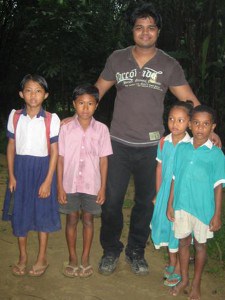 Remember Kamrul, the cycle van driver from Bangladesh you helped buy a cycle van for? Well, David Adhikary is the fine field communication specialist in Bangladesh who reported that story for us. That was one of his first assignments — he just started at Compassion Bangladesh in January. What a nice welcome you gave him!
Remember Kamrul, the cycle van driver from Bangladesh you helped buy a cycle van for? Well, David Adhikary is the fine field communication specialist in Bangladesh who reported that story for us. That was one of his first assignments — he just started at Compassion Bangladesh in January. What a nice welcome you gave him!
Now it’s your turn to ask David about his experiences as a Compassion employee, visiting precious sponsored children, and anything else you’re wondering about Bangladesh.
I’ll tell you a bit about him first. He just finished his electrical engineering degree in December of 2007 when he decided that he wanted to serve the Lord by working with Compassion’s ministry. (An engineer and a writer — talented guy!) He loves English and Bengali literature and is a big sports fan too.
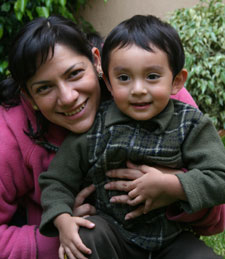 Remember when Chris went to Mexico? He got to meet Cesiah Magaña, who has been working with Compassion Mexico for seven years. She says the seven years have been wonderful — filled with blessings and challenges.
Remember when Chris went to Mexico? He got to meet Cesiah Magaña, who has been working with Compassion Mexico for seven years. She says the seven years have been wonderful — filled with blessings and challenges.
She currently works as the communication specialist, is married and has a precious 2 1/2-year-old son, Jair. She loves driving with her family to the towns around Mexico City, seeing their handicrafts and hearing their stories.
So it’s time to ask your questions of Cesiah and David. I’ll choose ten questions for each of them to answer.
A Day in the Life of a Bangladeshi Cycle Van Driver
Kamrul opens his eyes and looks out the window. It is still dark outside. He gets up and goes outside his house.
Kamrul washes his face with the water from the nearest pond. He breaks a branch from a nearby neem tree, whose branches are thin and good for teeth, and begins to clean his teeth. He is wearing just a lungi, the traditional Bangladeshi skirt for a male. He prepares himself for the hard day ahead of him. Kamrul, the father of Compassion-registered* child Mukta, is a cycle van puller. (more…)


